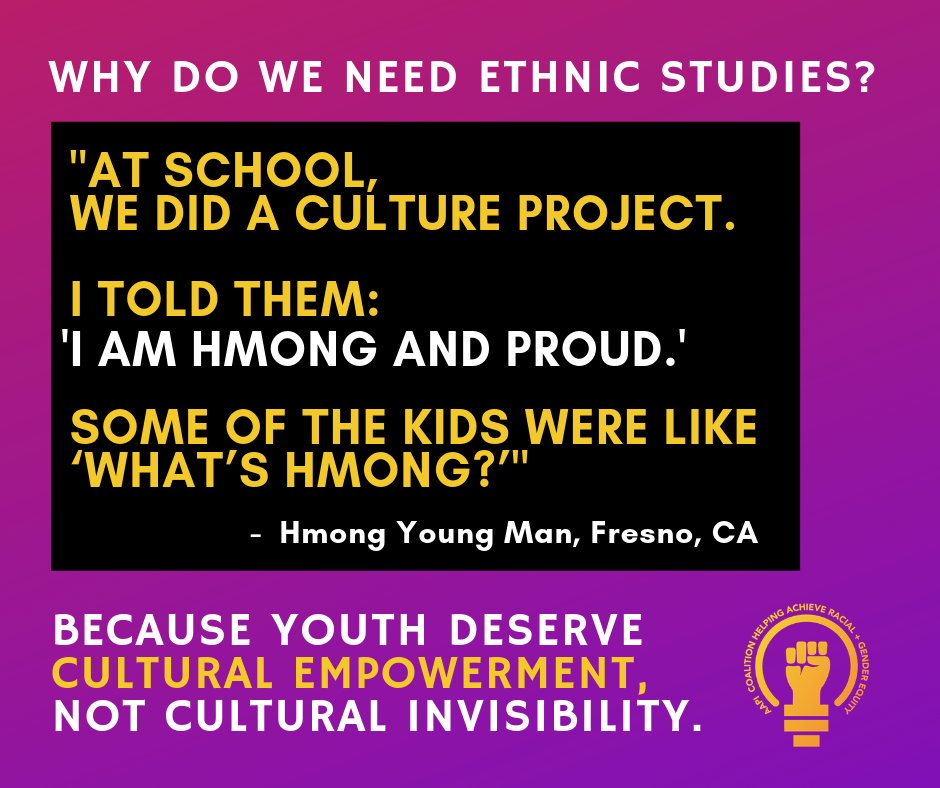June 7, 2019 IN: California, Education, Press Room
Asian American and Pacific Islander Youth Coalition in California Releases Findings on School Culture and Climate

“Can You See Me?” fact sheet examines the classroom and campus experiences of AAPI youth throughout the state of California
Sacramento, CA-The Asian American and Pacific Islander Coalition Helping Achieve Racial and Gender Equity (AAPI CHARGE), coordinated by SEARAC, is excited to launch the first of a series of factsheets that seek to uplift the challenges facing marginalized AAPI youth and young adults whose narratives are not often shared, heard, or understood.
Specifically focusing on barriers to education equity, “Can You See Me?” includes data and quotes that illustrate the lived experiences of Hmong, Cambodian, Iu-Mien, Laotian, and Samoan youth who participated in the coalition’s California AAPI Youth Assessment survey and focus groups. The coalition collected survey data from 813 youth and young adults, ages 12-30, and led focus groups in Fresno, Long Beach, Santa Ana, San Jose, and Stockton. Youth and young adults shared how they experience high rates of cultural invisibility and bullying in schools, in addition to receiving insufficient culturally relevant support to overcome their community’s intergenerational educational challenges. The data further highlight these disparities, including the finding that almost half of Cambodian, Hmong, and Iu-Mien respondents reported their parents completed less than a high school education.
Southeast Asian American and Pacific Islander youth and young adults also expressed how some of their struggles are often overlooked because the diverse histories and experiences of AAPI communities are not highlighted in the classroom or recognized at school. These barriers would remain invisible without the disaggregated data that are necessary to demonstrate the specific impact on each unique community.
“The concept of data is a tricky thing in the Pacific Islander community because the numbers have been used to tell us we’re not enough. The survey validated what we’ve long known anecdotally,” said Tavae Samuelu, Executive Director of Empowering Pacific Islander Communities (EPIC). “In some ways, this data quantify suffering and inequity.”
“By placing this data in the hands of AAPI youth, young adults, and community organizations, our coalition joins the effort to inform policymakers about the educational disparities that are frequently hidden behind the model minority myth- a false belief that all AAPI students achieve academic success and do not require support,” said Nkauj Iab Yang, Director of California Policy and Programs at SEARAC. “Our findings highlight the need for investment in disaggregated data, as well as the expansion of ethnic studies curricula and culturally relevant parent and student engagement, so that AAPI youth can overcome institutional challenges and finally attain education equity.”
Click here to access our new factsheet.
Introducing a Recharged CHARGE
With this factsheet, AAPI CHARGE is also launching our new logo, a raised fist inside a shining light bulb. This symbol and the color scheme were part of a youth-led selection process involving AAPI young people attending the Youth in CHARGE Summit in Fresno earlier this year. To learn more about the story behind the branding, please see a blog post authored by our Boys and Men of Color Coordinator Gabriel Garcia.





